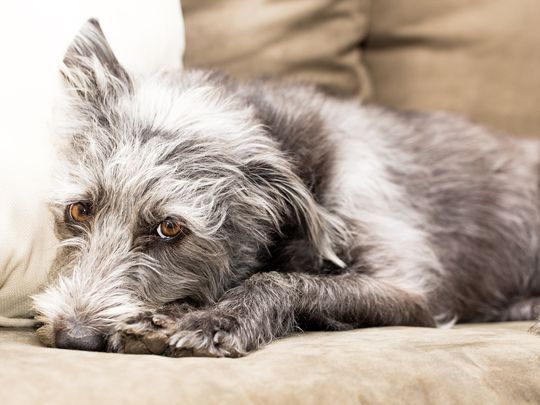Have you ever walked in on your dog to find a potty mess on the rug or a torn up pillow while they are cowering down low with big eyes, their head down and their tail between their legs? As humans we tend to believe this is an admission of guilt or an apology because our dog knows it has been bad. But is that true?
Yes and no. Canine cowering evolved as a survival tactic among wolves. Animal behaviorists call it an “apology bow.” City University of New York molecular biologist Nathan Lents wrote in Psychology Today that young wolves show apology bows as they begin social integration. Dogs, like wolves, engage in the same rough and tumble play which in turn becomes a laboratory for learning the pack’s social rules.
According to Lents, a playful wolf that bites too hard will be spurned by the pack for bad behavior. In order for the wolf to return to the social unit (pack), the wolf must approach with an apology bow. Such social norms and behaviors are the same for dogs. “Dogs have inherited this behavior and they will use it after any kind of infraction that results in being punished,” Lents wrote. “As social animals, they crave harmonious integration in the group and neglect or isolation is painful for them.” Lents further points out that a dog in trouble will lower their head to avoid contact and put their tail between their legs, mimicking the actions of a lower-ranking wolf submitting to a more dominant one.
One of the first “guilty dog look” studies was conducted by a New York City Barnard College psychology professor in 2009. The study revealed that the look appeared most often when owners scolded their dogs, regardless of whether the dog had actually disobeyed. Lents notes that when your dog behaves in this manner it is less a direct apology or expression of guilt as opposed to an act of submission. When you chide your dog or when they pick up on your energy of disappointment, Lents says they are essentially communicating, “Can we be friends again?”
On a final note, have you ever seen your dog(s) cower in this manner when you are angry at something that has nothing to do with them like arguing with your spouse, children or a customer service representative on the phone? Think about it.
This article was adapted from a story in USA Today by Josh Hafner titled “What dogs actually mean when they look guilty, according to science.”




